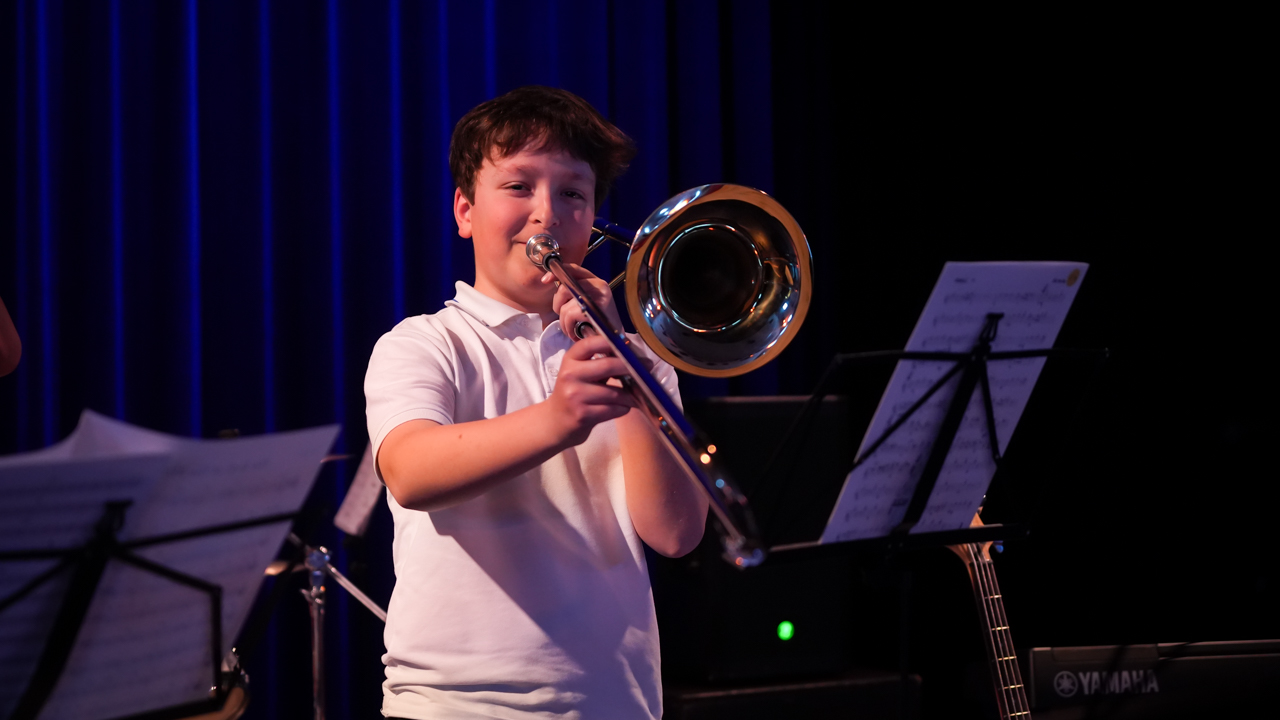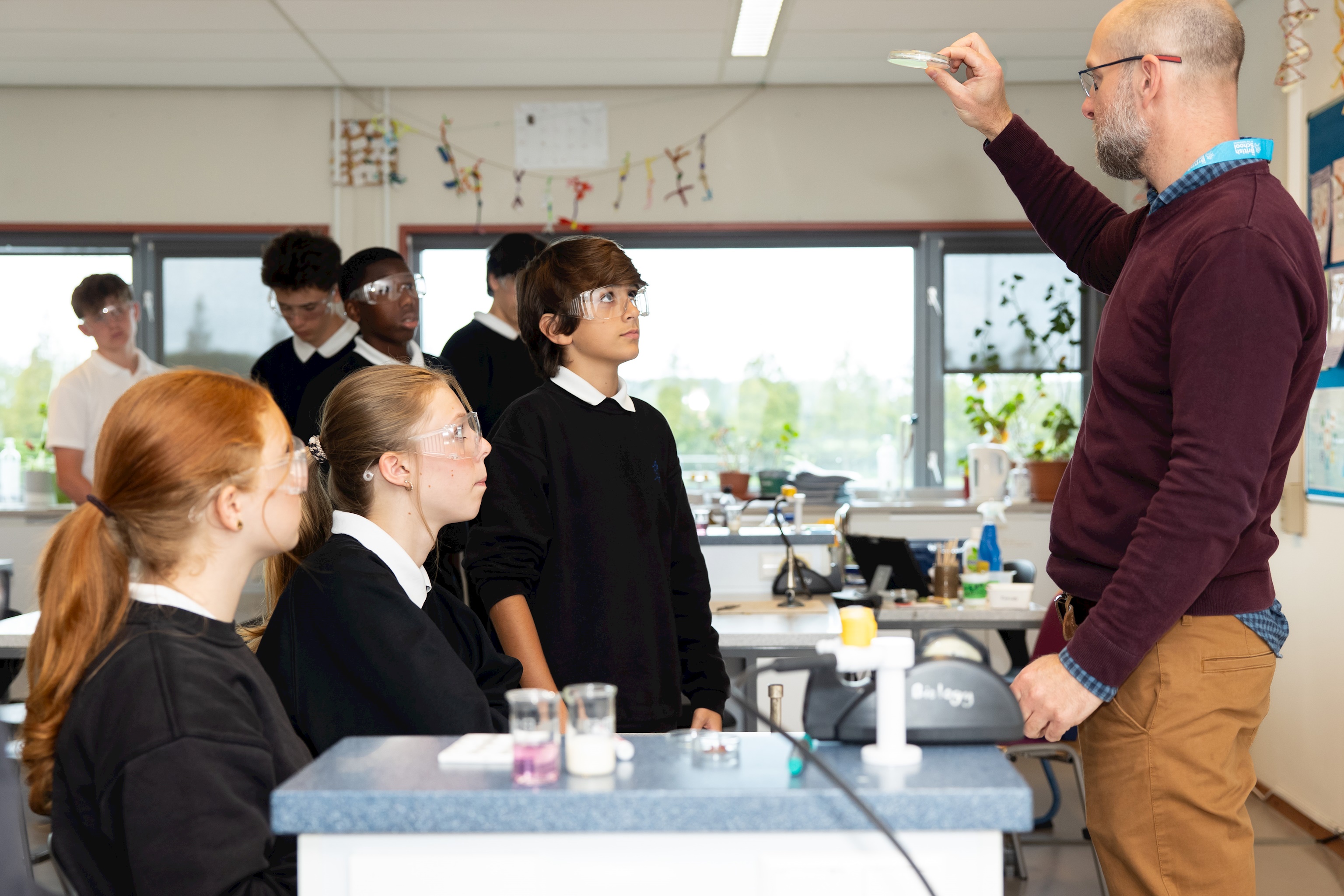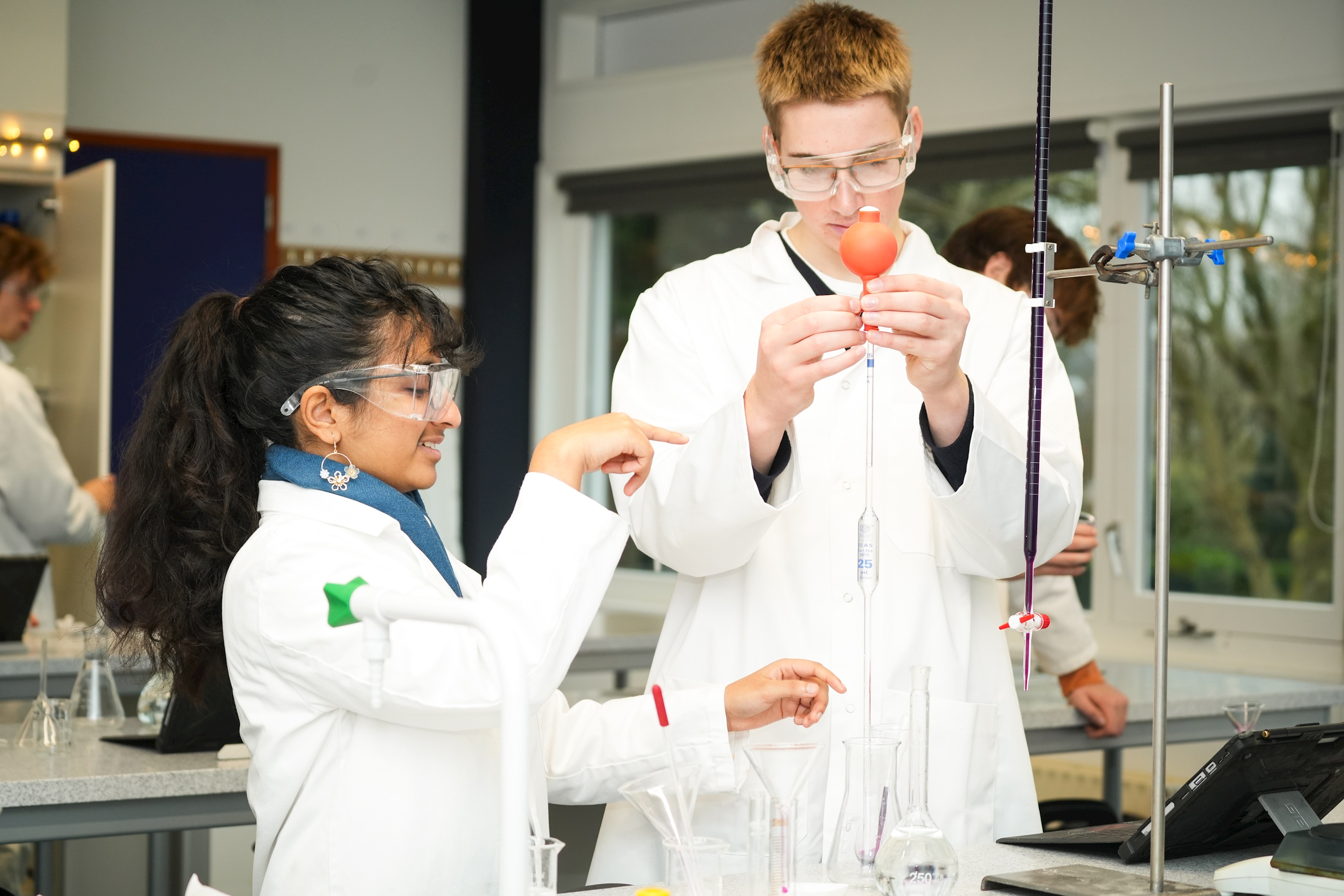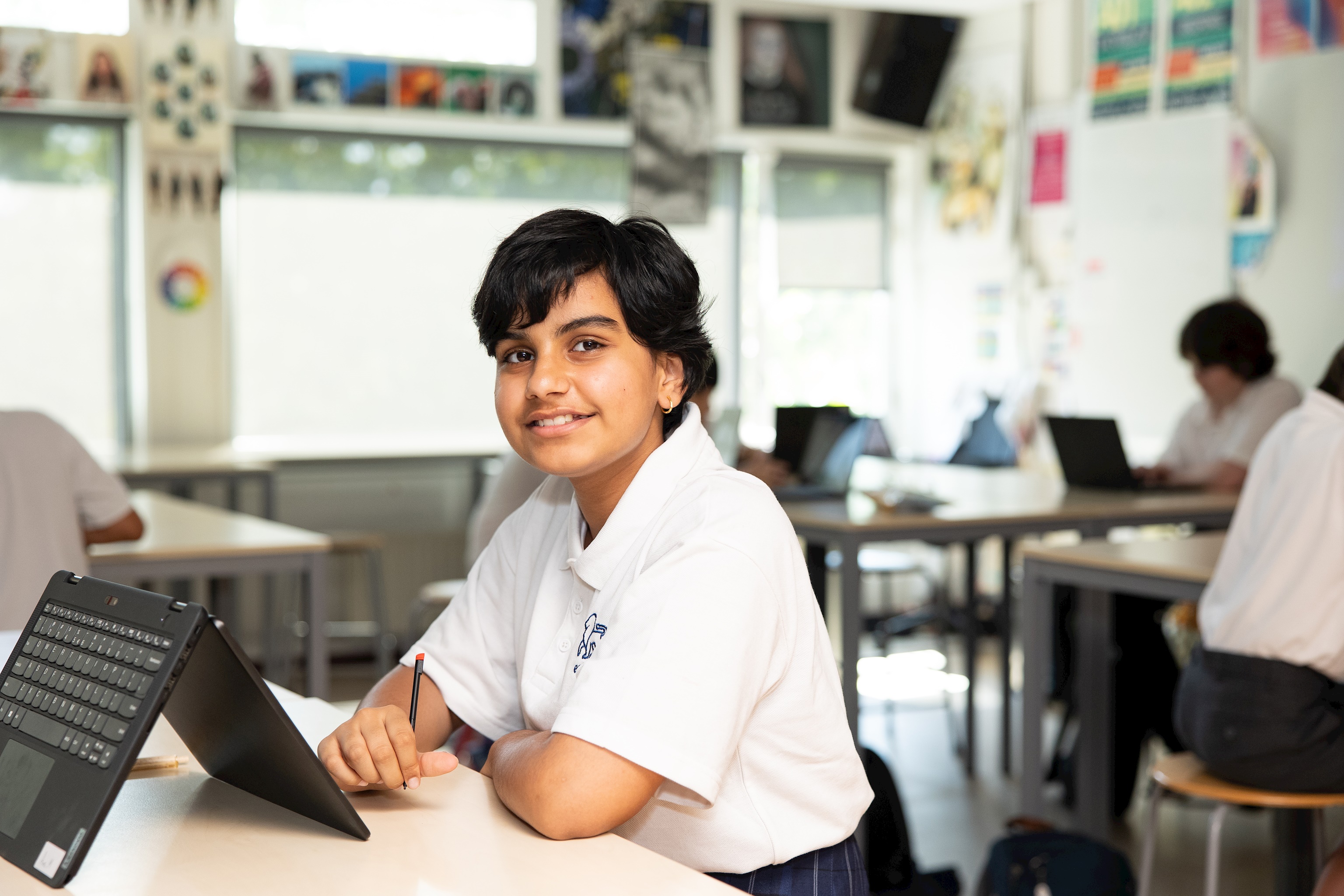SSV Options: A guide to GCSE subjects (Years 10 and 11) | 2024 - 2026
Contents
Student wellbeing and pastoral support
Core Subjects:
PSHE
Core PE
English Language
English Literature
Mathematics
Sciences
Curricular Support:
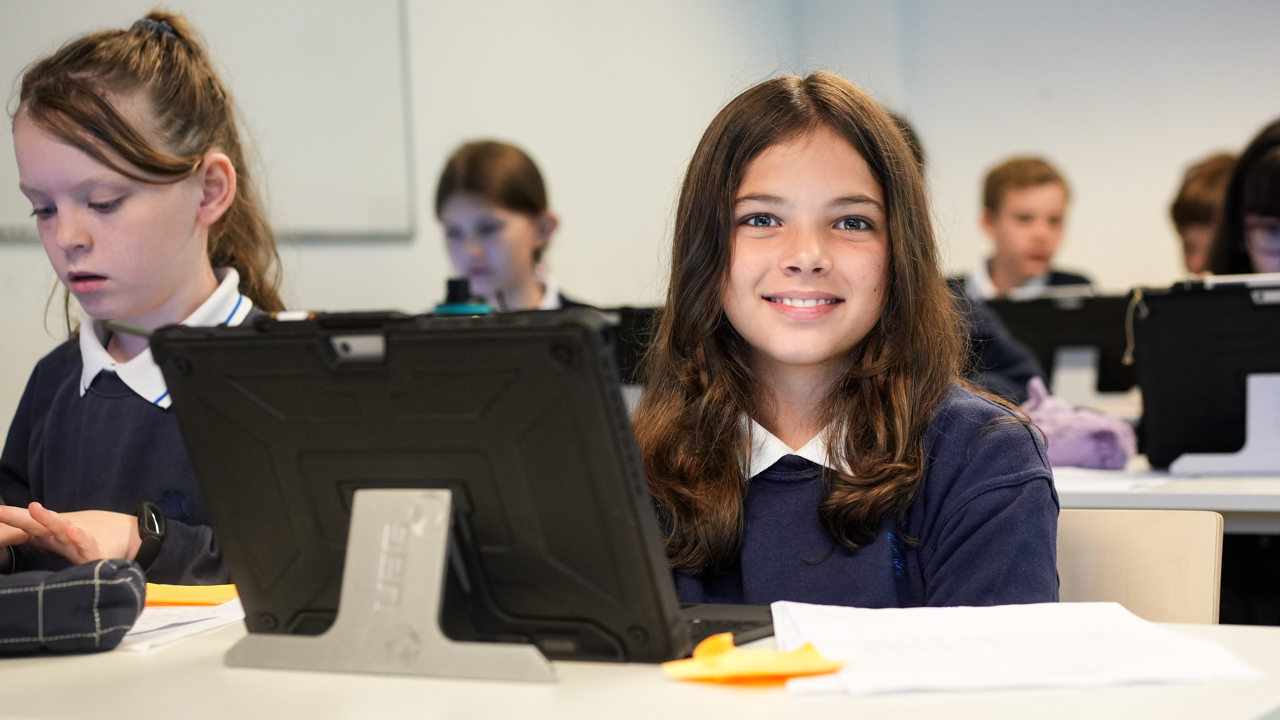
Student wellbeing and pastoral support
At the British School in the Netherlands wellbeing is a priority. We have established a network of support, advice and care that will help students flourish emotionally and socially.
Throughout Years 10 and 11, students are supported by their personal tutor. The relationship with the tutor is vital—they have daily contact with the students and are responsible for their continued pastoral care as they progress through the GCSE programme.
The tutor is also the first point of contact between home and school. The Head of Year and our dedicated Health Team are also here to support our students on their educational journey.
Our tutor time and assembly programme is designed to promote positive connections that enable everyone to feel part of our vibrant and diverse school community.
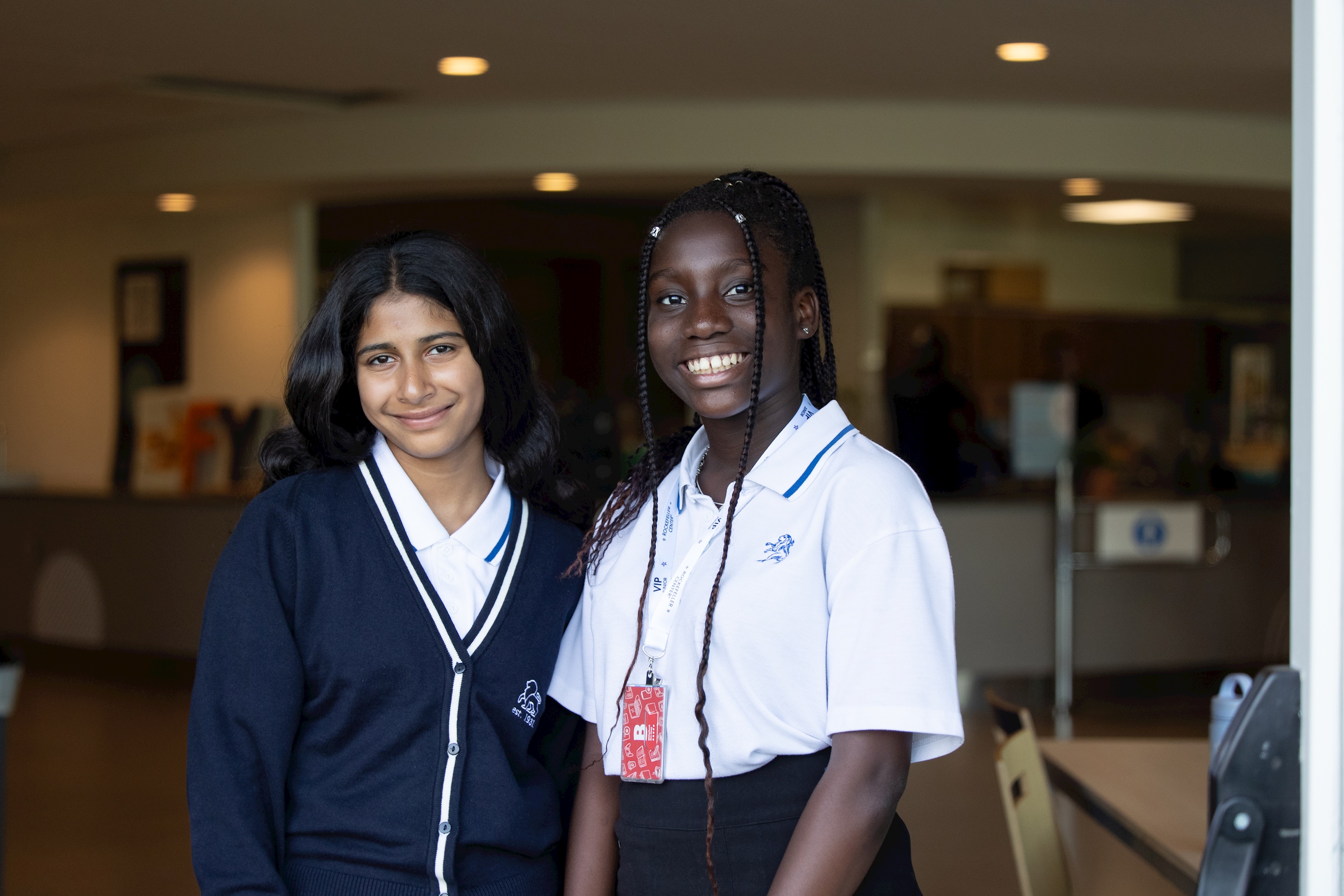
Through a range of activities, we aim to equip our students with the skills and knowledge to develop as a young person and successfully navigate the world around them.
Key topics relate to:
- Health and Wellbeing;
- Living in the Wider World;
- Relationships and Study Skills.
Core Subjects
PSHE (Personal, Social, Health and Economic education)
PSHE (Personal, Social, Health and Economic education) provides students with the knowledge, understanding and skills to make informed decisions about their lives. All students have one PSHE lesson per week in Years 7-11.
Aims of the course
The aims of PSHE are to cultivate students’ personal and social development, promote wellbeing, ensure safety awareness, provide education on relationships and sex, instil financial literacy, foster good citizenship, enhance critical thinking and decision-making skills, and prepare students for the challenges and opportunities of adulthood. The overarching goal is to equip our students with the knowledge, skills, and awareness needed for confident, healthy, and responsible living.
The lesson content of the course is structured around the following themes:
- Health and Wellbeing: How to live a healthy lifestyle with positive mental wellbeing. This includes how to assess risk and make safe decisions, with accurate information on the harmful effects of smoking, vaping, alcohol and substance abuse.
- Relationships and Sex Education: How to negotiate and maintain positive relationships with others; including developing communication skills and managing difference. This includes lessons on safe and healthy sexual relationships, STIs, contraception and consent.
- Economic Wellbeing: How to make sound economic decisions and become financially literate, including lessons on basic economics and money management.
- Citizenship: To develop the skills necessary to become active, global citizens who are aware of their rights and responsibilities and know how to bring about change. This includes lessons on prejudice, discrimination, diversity and legal and human rights.
- Personal Development: To develop effective criticalthinking skills and study techniques in order to become high performance learners at school and in higher education. This unit will include lessons on managing examination stress, good revision techniques and careers education.
Core PE
All Y10 and Y11 students follow a compulsory Physical Education programme. This is part of our whole school curriculum, not matter the age, as it is shown to maintain social, emotional and physical health, and lead to lifelong attitudes to activity. In KS4 PE changes to have an options format where students are given the choice of several activities.
Each option runs over a 4-week block before changing to the next option.
Some of the options available are:
- Athletics
- Badminton
- Basketball
- Boot Camp Fitness
- Cricket
- Cross-country
- Fitness Suite
- Football
- Handball
- Hockey
- Rugby (Touch/Contact)
- Softball
- Table Tennis
- Tennis
- Ultimate Frisbee
- Volleyball
Full and correct PE kit is still required. Before choosing an option, each student should consider the equipment required for that option.
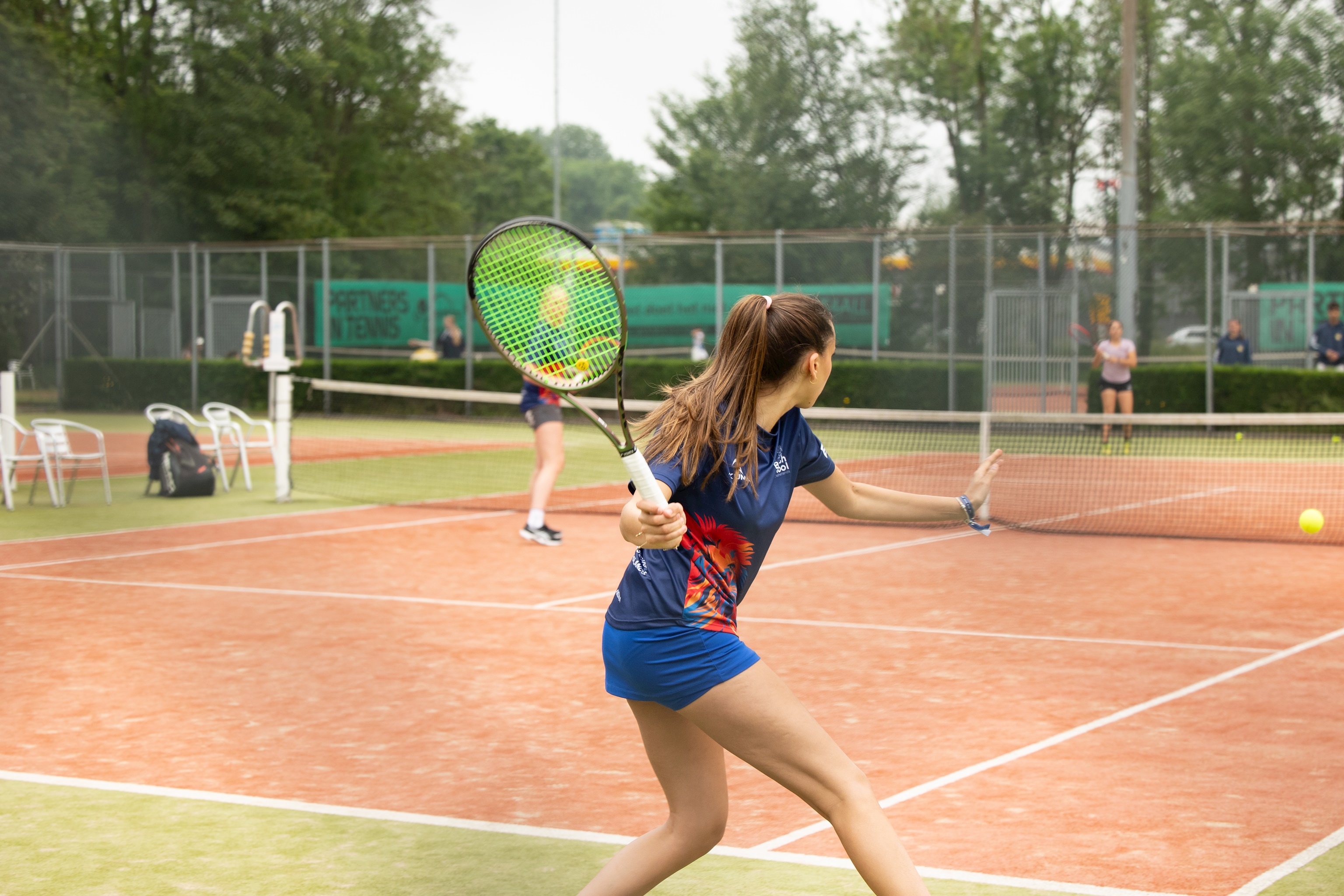
English Language
The GCSE in English Language enables learners to:
- read a wide range of texts, fluently and with good understanding
- read critically, and use knowledge gained from wide reading to inform and improve their own writing
- write effectively and coherently using Standard English appropriately
- use grammar correctly, punctuate and spell accurately acquire and apply a wide vocabulary, alongside a knowledge and understanding of grammatical terminology, and linguistic conventions for reading, writing and spoken language.
Examination board and syllabus code
Eduqas/ WJEC C700QS (QAN 601/4505/5)
Course details
The course will cover:
- Reading 20th century fiction.
- Creative writing.
- Reading 19th and 21st century non-fiction.
- Developing a range of approaches to transactional/ persuasive writing.
Examination and assessment details
Two written papers and one non-examined assessment in spoken language (whilst this is examined through a formal presentation, it does not form part of the final mark and grade).
- Written paper 1: 1 hour 45 minutes; 40% of the qualification. This paper covers 20th century literature reading and creative prose writing.
- Written paper 2: 2 hours; 60% of the qualification. This paper covers 19th and 21st century non-fiction reading and transactional/persuasive writing.
Sixth form progression and future careers
A Level English Literature or English at either Higher or Standard Level at IB.
English Language at GCSE is a mandatory qualification for students applying to universities in the UK and those in all English-speaking countries.
English Literature
The GCSE in English literature enables learners to:
- read a wide range of classic literature fluently and with good understanding, and make connections across their reading
- read in depth, critically and evaluatively, so that they can discuss and explain their understanding and ideas
- develop the habit of reading widely and often
- appreciate the depth and power of the English literary heritage
- write accurately, effectively and analytically about their reading, using Standard English
- acquire and use a wide vocabulary, including the grammatical terminology and other literary and linguistic terms they need to criticise and analyse what they read.
Examination board and syllabus code
Eduqas/WJEC C720QS (QAN 601/5246/1)
Course details
The course covers the study of:
- A Shakespeare play
- Poetry from 1789 to the present day from the WJEC Poetry Anthology
- A post-1914 piece of prose or drama e.g. Lord of the Flies (Golding)
- A piece of 19th century prose e.g. A Christmas Carol (Dickens)
- Unseen poetry from the 20th/21st century
In all cases students are not permitted to take copies of the texts studied into the examination
Examination and assessment details
Two written papers:
- Written paper 1: 2 hours; 40% of the qualification. This paper covers the Shakespeare play and the poetry anthology.
- Written paper 2: 2 hours and 30 minutes; 60% of the qualification. This paper covers the post-1914 prose/drama, 19th century prose and the unseen poetry.
Sixth form progression and future careers
A Level English Literature or English at either Higher or Standard Level at IB.
English Language is a mandatory qualification for students applying to universities in the UK and those in all English-speaking countries.
EAL (English as an Additional Language)
English as an Additional Language (EAL) is available as an option for students who are developing proficiency in English and need some support to fully access the mainstream curriculum at an academic level. Our goal is to reinforce language skills in small groups so that students can process and respond to texts and develop higher level reading and writing skills in all subjects.
Examination board and syllabus code
Pearson Edexcel English as a Second Language (4ES1)
Course details
All Year 10 students are included in mainstream English Language and Literature. Students who choose EAL as an option will have an additional 5 hours of support from EAL teachers in small groups to consolidate their mainstream English lessons and develop language skills for the wider curriculum. They may also receive in-class support.
At the end of Year 10, these students will decide the best route forward in consultation with English and EAL staff. This could be to continue GCSE English Language and GCSE English Literature in Year 11 or to opt for the IGCSE in English as a Second Language.
Throughout the course we help students to understand context, identify different genres and extend their academic literacy. Progress in reading, writing, speaking and listening is monitored through ongoing assessment and we have a deliberately flexible approach to curriculum planning so that we can meet individual needs. Some of the main areas of focus include:
- Extending sentences in fiction and non-fiction texts
- Broadening vocabulary
- Developing text structure within different genres
- Creating atmosphere and mood
- Learning to write persuasively
- Understanding inference and word choice
- Developing presentation skills
- Taking notes and using informal language
- Participating in an extended reading programme of graded readers
- Responding to fiction and non-fiction texts in structured analytical paragraphs.
EAL lessons are both challenging and supportive and we emphasise extended reading as a means to developing fluency and inference. We also draw on students’ full repertoire of languages in order to aid their learning.
This means that students might research in their home language in order to connect ideas to prior learning before completing the task in English.
Examination and assessment details
If students decide to continue with mainstream English Language and English Literature in Year 11, their examinations and coursework will be the same as the GCSE English Language and Literature courses.
If, by agreement with the EAL Department, students choose to take the Edexcel English as a Second Language course in Year 11, they will be assessed on Reading and Writing, Listening and Speaking.
Sixth form progression and future careers
We currently support bilingual students in the Sixth Form if they feel the need to develop their academic literacy skills in order to better access their post-16 courses. This support takes the form of small group work where the focus of learning is student directed. More information is available on www.britishschool.nl or through an appointment with Ms K Anderson, Head of the EAL department.
Mathematics
The aims of the course are to increase the mathematical skills of the individual and to enable students to apply these skills in solving a variety of problems in different contexts.
Examination board and syllabus code
Edexcel (1MA1)
Course details
There are six key areas of study:
- Number
- Algebra
- Ratio, proportion and rates of change
- Geometry and measures
- Probability
- Statistics
Examination and assessment details
Students take three examination papers at the end of the course.
- Higher level: 3 x 1.5 hour paper
- Foundation level: 3 x 1.5 hour paper
A calculator is permitted on two of the papers, we recommend the Casio fx-85GT.
Sixth Form progression and future careers
There are several options available to students wishing to pursue mathematics in the sixth form. A-level Mathematics: The course includes Pure Mathematics, Mechanics and Statistics. A-Level Further Mathematics: The course includes Pure Mathematics and Mechanics. (* students choosing Further Mathematics must also choose A-Level Mathematics)
IB Mathematics. There are 3 courses available; 1 Higher level course and 2 Standard level courses. Higher level: Mathematics: Analysis and approaches Standard level: Mathematics: Analysis and approaches Standard level: Mathematics: Applications and interpretation.
Mathematics is considered a key subject for many post-18 courses, including, but not limited to Mathematics, Engineering, Computer Science, Economics, Natural Sciences and Actuarial Sciences.
GCSE Sciences
AQA GCSE courses in Science should enable learners to:
- develop their understanding of the nature of science and its applications and the interrelationships between science and society
- develop and apply their knowledge and understanding of the scientific process through hypotheses, theories and concepts.
- develop and apply their observational, practical, enquiry and problem-solving skills and understanding in laboratory, field and other learning environments.
- develop their ability to evaluate claims based on science through critical analysis of the methodology, evidence and conclusions.
Examination board and syllabus code
AQA
Separate Science (8461/ 8462/8463) Trilogy (8464)
Course details
Students take one of two routes for studying Science in Years 10 and 11.
- Combined Science Trilogy: Students study all Biology, Chemistry and Physics leading to a double award in GCSE.
- Separate Science: Students study all Biology, Chemistry and Physics leading to individual awards in GCSE.
Trilogy and Separate cover mostly the same content. The difference is often the depth you go to in each topic.
Both courses give students a wide breadth of understanding and skills in working scientifically. Both courses allow students to transition well to A Level or IB Sciences.
Examination and assessment details
- Combined Science: Students will take two examinations of 1 hour 15 minutes in each of Biology, Chemistry and Physics. This is a dual award qualification, therefore two grades will be awarded for ‘Science’, with no separate grades for Biology, Chemistry and Physics.
- Separate Science: Students will take two examinations of 1 hour 45 minutes in each of Biology, Chemistry and Physics. Separate Science students cover more content than combined Science students, which is why the examinations are longer. They will be awarded three GCSEs, one each in Biology, Chemistry and Physics. Marks from one course do not affect the other courses.
Sixth form progression and future careers
After receiving their results, students may wish to continue with their study of science. The Biology, Chemistry and Physics Departments all offer post-16 courses which are available as options in Years 12 and
13. Students from both routes (Combined Science and Separate Science) will be able to study courses in the Sixth Form.
Students wishing to study the IB Diploma must study a subject from the Group 4 Science options. The IB courses are available at Higher and Standard level. For further details, please talk to the Science Faculty.
GCSE OPTIONS
Art & Design
A course in Art and Design should encourage learners to:
- actively engage in the process of Art and Design in order to develop as effective and independent learners, and as critical and reflective thinkers with enquiring minds
- develop creative and imaginative powers, and the practical skills for communicating and expressing ideas, feelings and meanings in art and design
- become confident in taking risks and learning from their mistakes when exploring ideas, materials, tools techniques and technology
- develop investigative, analytical, experimental and interpretative capabilities, aesthetic understanding and critical skills
- show understanding of codes and conventions of art and design, and awareness of contexts in which they operate
- demonstrate knowledge and understanding of art and design in contemporary societies and in other times and cultures
- develop personal attributes including self-confidence, resilience, perseverance, self-discipline and commitment.
All key skills that apply to the future world our students are moving into - being a creative thinker.
Examination board and syllabus code
AQA (8201)
Course details
We deliver a broad-based course where emphasis is placed on creativity and the development of the individual.
Students are encouraged to become independent thinkers. As the course develops this provides them with opportunities to explore an extensive range of skills, both practical and academic.
Problem solving and creative thinking underpins the philosophy of our teaching, actively encouraging and supporting students through a progressive frame of learning.
Year 10 (Portfolio)
The first year is made up from a series of workshops that provides students with key skills. Each workshop is based on a theme looking at artists and a variety of
approaches. Areas covered include Portraiture, Graphics, Still-Life, and the Environment. This is through drawing, painting, printing, collage, mixed media, textiles and sculpture.
Class work is supported by extra study at lunch, after school and at home. It is essential that research and practical work are completed out of school where first- hand resourcing and research of artists is vital to the course. Access to a camera, printer and scanner would be very beneficial for aspects of the course. In order
to complete work in and out of school, it is important that students have a range of drawing pencils, coloured pencils, and a set of watercolours/acrylic paints.
Students are encouraged to experiment with ideas and explore differing media in the development of work towards outcomes. All work produced contributes to the coursework (portfolio) aspect of the GCSE.
Year 11 (Portfolio)
In the Autumn term of Year 11, students produce an independent, sustained study to add to their portfolio. The theme of the workshop is of their own choice.
The unit allows the student to showcase their talents, skills, and understanding of the subject, building on their previous experiences. It provides an opportunity
for them to become independent learners taking responsibility and ownership of their work. Many of our students find these skills transferable and invaluable for other areas of their education both at GCSE and A Level. Most find it a creates a good balance to their curriculum and lessons through the week.
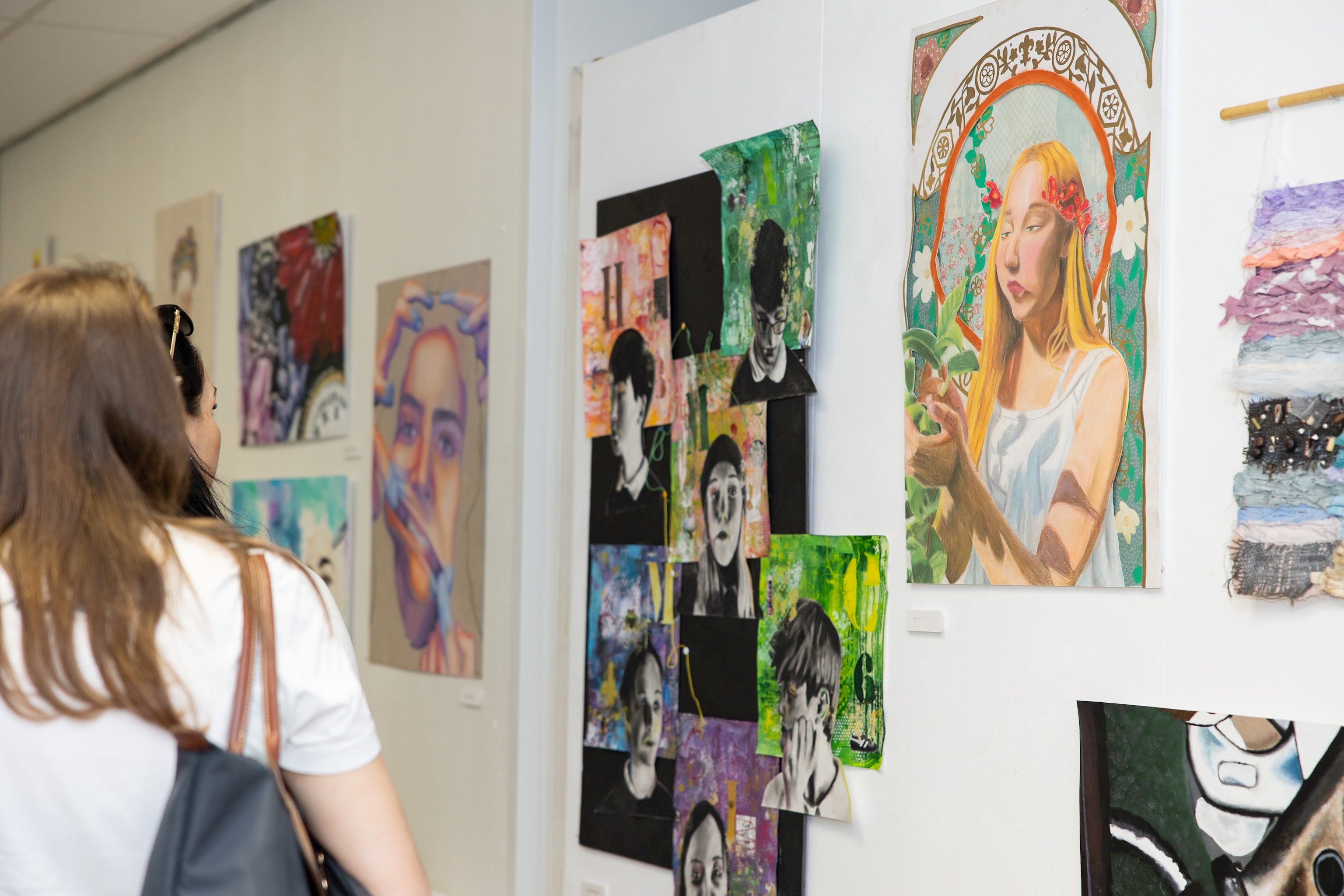
Examination and assessment details
The overall GCSE grade is based on the following:
- Portfolio – 60% Externally
- Set Assignment – 40%
In Year 11, the exam board sets a series of starting points for students to work from. They prepare themselves in a similar way to the previous Year 11 work within a set period of time from January through to the start of May. The final piece is then produced in ten hours of supervised time.
All assessment is based on practical work produced over the period of the course.
There is no written examination.
Sixth form progression and future careers
Both the IB Visual Arts programme and the AS/A Level courses in Art and Design are available to anyone who shows an aptitude for and/or a real interest in the subject and wants to take it further. Both courses build on the skills and approaches developed during the GCSE course.
Art is an important subject to study when you are interested in the general areas of the Creative Industries such as Advertising, Animation (Film), Architecture and Interiors, Design Crafts, Game and Character Design, Fashion and Textiles, Film and TV Production, Fine
Art, Graphic Design, Journalism, Photography, Product Design, and Teaching.
Our department offers you the best springboard onto these. We are extremely successful, consistently delivering high standards and student attainment. Even if you do not want to follow a career in the Creative Sector, Art and Design is a good subject to study because it helps you become an independent learner,
a creative thinker, a reflective person, and a good organiser managing projects.
All these qualities are important for every area of your life. The subject provides a challenge that stretches people’s ability, both creatively and intellectually.
These are some of the main reasons why several of our students not entering the creative field carry on with the subject, as it enhances their studies in other areas.
Computer Science
The most important aim of the Pearson-Edexcel GCSE Computer Science course is to develop computational thinking skills. Those include the essential life skills of problem-solving, programming, decomposition, abstraction and algorithm design.
Students are given the opportunity to explore how computers work, how they’re used, and to develop essential computer programming and problem-solving skills. The course has been designed to get students working with real-world programming and provides a good understanding of the fundamental principles of Computer Science. It is suited to students who have a logical and analytical mind and who are interested to know more about programming and how computers operate.
Examination board and syllabus code
Pearson Edexcel (1CP2)
Aims of the course
The skills and knowledge developed through this qualification will help students to:
- Understand and apply the fundamental principles and concepts of computer science, including abstraction, decomposition, logic, algorithms, and data representation
- Analyse problems in computational terms through practical experience in solving such problems, including designing, writing and debugging programs
- Think creatively, innovatively, analytically, logically and critically
- Understand the components that make up digital systems, and how they communicate with one another and with other systems
- Understand the impacts of digital technology on the individual and on wider society
- Apply mathematical skills relevant to computer science
Course details
The Pearson-Edexcel GCSE Computer Science specification enables students to apply computational thinking in context, across a wide range of problems. You will learn to think computationally and prepare yourself for real-world computer challenges. The six main areas of Computer Science that are covered are:
- Computational Thinking
- Data
- Computers
- Networks
- Issues and Impact
- Problem Solving with Programming
The exam board chosen programming language for the course is Python (v3.) Students will be provided with a Programming Language Subset (PLS) on which they will be assessed. The PLS is a specific set of Python 3 programming constructs that students need to understand and be able to practically use in the practical examination.
Examination and assessment details
There are two examined components:
- Component 1 ‘Principles of Computer Science’ – 1 hour 30 Minutes
- A written paper covering all topics consisting of multiple choice, short and extended open - response questions.
- 50% of the qualification.
- Component 2 “Application of Computational Thinking” – 2 hours
- A practical on-screen examination consisting of practical programming problems to solve.
- 50% of the qualification. The three assessment objectives will be assessed across the two papers.
Sixth form progression and future careers
The school currently offers Computer Science as part of the A-level pathway in the Sixth Form at SSV and an IB Computer Science may also possibly be offered as an IB option at SSV in the near future, but this is to be confirmed.
Someone can qualify in Computer Science and do anything: a career in medicine, law, business, politics, any type of science or engineering, and even the arts. Most obviously, the qualification lays a foundation for further study of Computer Science or related subjects and is applicable to any career path involving programming, software development, web development and engineering.
Careers in Computer Science could land you a job as a programmer, systems analyst, software engineer, network manager, systems technician, web developer, games developer or computer engineer, to name only a few.
A recent statistic showed that over 70% of jobs in STEM subject (Science, Technology, Engineering and Maths) involved Computer Science skills.

Design Technology
After studying D&T at Key Stage 3 students will have experienced a wide range of different ways to both design and manufacture products using up-to-date technological processes. This course allows students to specialise in the focus area of product design where they will learn about a range of materials, manufacturing processes, techniques and technologies and be able to use them as appropriate to the design and make process.
Examination board and syllabus code
AQA (8552)
Aims of the course
GCSE D&T encourages students to:
- demonstrate fully their Design and Technology capability, which requires them to combine skills with knowledge and understanding in order to design and make quality products suitable for production in quantity;
- acquire and apply knowledge, skills, technical principles and understanding through:
- identifying, investigating and outlining design possibilities to address needs and wants
- analysing and evaluating products and processes
- engaging in focused tasks to develop and demonstrate techniques
- engaging in strategies for developing ideas, planning and producing products that are fit for purpose
- recognising the moral, cultural and environmental issues inherent in design and technology.
Our GCSE Design and Technology course sets out the knowledge, understanding and skills required to undertake the iterative design process of exploring, creating and evaluating. The subject content has been split into three sections:
- Core technical principles
- Specialist technical principles
- Designing and making principles
Core technical principles include: New and emerging technologies, Energy generation and storage, Developments in new materials, Systems approach to designing, Mechanical devices, Materials and their working properties.
Specialist technical principles include: Selection of materials or components, Forces and stresses, Ecological and social footprint, Sources and origins, Using and working with materials, Stock forms, types and sizes, Scales of production, Specialist techniques and processes, Surface treatments and finishes.
Designing and making principles include: Investigation, primary and secondary data, Environmental, social and economic challenge, The work of others, Design strategies, Communication of design ideas, Prototype development, Selection of materials and components, Tolerances, Material management, Specialist tools and equipment, Specialist techniques and processes.
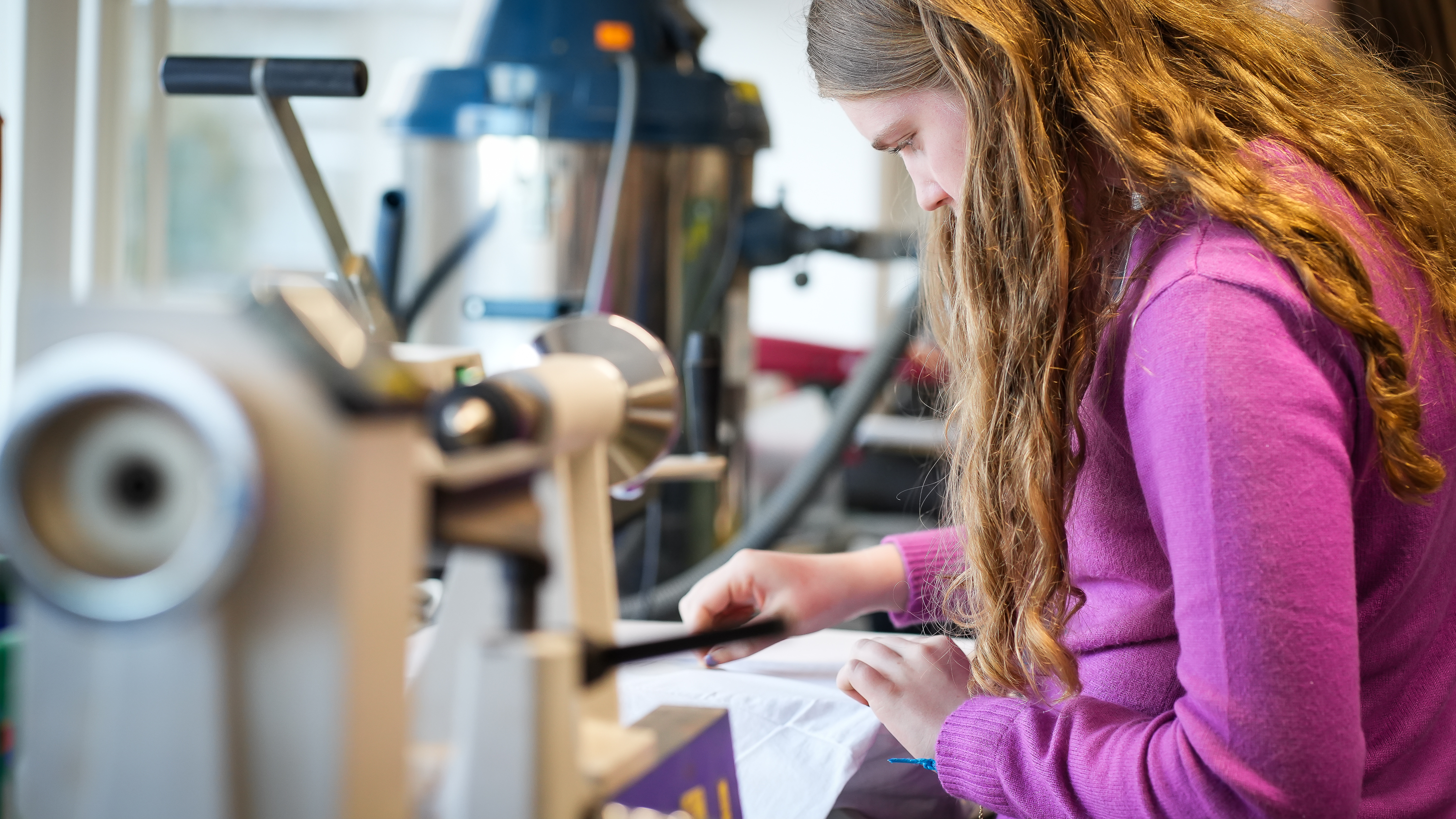
Examination and assessment details
The course is examined in two ways:
- Single Written Paper (2hrs) 50% of total marks The paper is split into three sections. Section A covers ‘core technical principles’. Section B covers ‘specialist technical principles’. Section C covers ‘designing and making principles’. Questions vary from multiple choice to extended response. The paper will also contain 15% mathematical skills applied in a Design and Technology context.
- Non-Examined Assessment (coursework) 50% of total marks
The NEA Task will be internally assessed and externally moderated. It will consist of a single design and make activity which will be chosen from a range of contexts given by the exam board in June of Year 10. This is expected to take 35 hours in total. Students will design and make a 3-dimensional physical prototype supported by an electronic design portfolio of approximately 20 pages. The NEA begins during the Summer Term of Year 10 and will be completed during the Spring Term of Year 11.
Sixth form progression and future careers
There are opportunities in the Sixth Form to study A level in Design and Technology (Product Design).
Alternatively Design Technology can be studied at higher or standard level as one of the sciences in Group 4 IBDP. Students opting to continue their studies into the sixth form have gone on to university to study courses such as: Engineering, Product Design, Architecture, Interior design, Graphics courses, Jewellery and Silversmithing.
Drama
Learners opting for Drama will be given opportunities to develop the ability to read, understand and respond to a wide range of drama texts; to develop an awareness of the social, historical and cultural contexts and influences in the study of drama and theatre; to develop the ability to construct and convey meaning in speech and writing, matching style and audience; and to experiment with and develop confidence in dramatic presentation and collaboration in group work.
Examination board and syllabus code
Eduqas (C690QS)
Course details
Learners will investigate practitioners and genres of drama, work collaboratively to develop ideas to communicate meaning and experiment with dramatic conventions, forms and techniques to produce and realise a piece of original theatre. They will also have the opportunity to participate in the performance of an extract from a play text. Learners will demonstrate their knowledge and understanding of drama, including their ability to interpret text for performance in a written examination. However, in preparation for this assessment, learners are encouraged to study their chosen text as a performer, designer and director.
Learners are encouraged to see live theatre productions throughout the course and will be required to see live or streamed theatre at least once during the course as these productions will inform written work.
Drama requires group work and performing in front of an audience. Sixty percent of a learner’s mark will be affected by the relationships that they form with group members and as such, learners must be willing to work as part of a team to create performances for assessment. Learners should expect to work with peers outside of class-time in rehearsal.
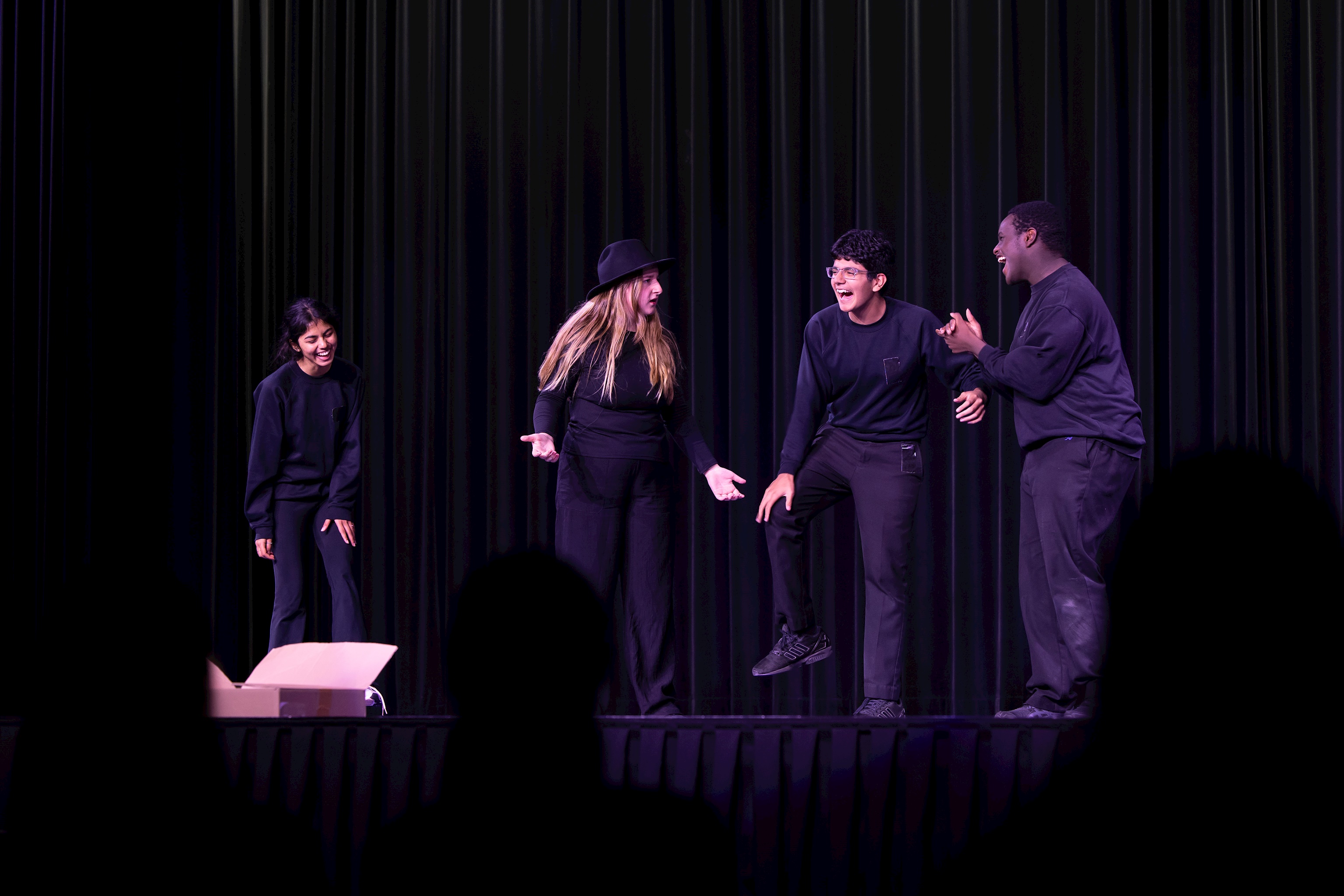
Examination and assessment details
Component One – Devising Theatre:
- 40% of qualification – internally assessed, externally moderated.
- Learners will participate in the creation, development and performance of a piece of devised theatre using either the techniques of a theatre practitioner or a genre, in response to a given stimulus.
- Learners must produce:
- a realisation of their piece of devised theatre
- supporting evidence
- an evaluation of the final performance
Component Two – Performing from a Text:
- 20% of qualification – externally assessed by a visiting examiner.
- Learners study two extracts from the same performance text and participate in one performance using sections from both extracts.
Component Three – Interpreting Theatre:
- 40% of qualification – written examination (1 hour 30 minutes), externally assessed.
- Section A: Set Text A series of questions on one set text.
- Section B: Live Theatre Review One question requiring analysis and evaluation of a given aspect of a live theatre production seen during the course.
Sixth form progression and future careers
Currently IB & A Level English Literature and IB Theatre & A Level Drama and Theatre are offered in the Sixth Form. Learners wishing to take Drama and Theatre do not necessarily have to have studied Drama at GCSE level but they will need to have met minimum requirements in English or be able to otherwise satisfy the faculty of their ability to tackle these courses.
The communication, collaborative and analytical skills allow learners to utilise their Drama GCSE in any career that they choose to follow.
Dutch
In Y10 and Y11, students can carry on studying Dutch, they will follow the CNaVT course. There are two possible pathways:
- The A2 level pathway for students who have not yet passed this qualification in Y9.
- The B level pathway for students who already have passed their A2. In Y10, students will work towards the B1 level before being split into two groups in Y11 based on their fluency, a B1 and a B2 group.
Examination board and syllabus code
CNaVT (Certificaat Nederlands als Vreemde taal / Certificate Dutch as a Foreign language) is an exam board which provides exams on various levels as per the Common European Framework of Reference for Languages
Course details
The A2 exam consists of personal life situations, such as reading personal messages, extracting information from a leaflet, explaining personal interests and so on.
The B1 course is designed for students aiming to function independently and effectively in more formal contexts within Dutch society.
The B2 exam consists of tasks from higher education, such as summarising a lecture, formulating your own point of view, writing an argumentative letter, presenting and so on.
Examination and assessment details
All exams consist of three parts:
- Part A: listening and writing
- Part B: reading and writing
- Part C: speaking and listening in conversation, and at B2 level also presenting (individual, with examiner)
A paper dictionary (Dutch to personal language) may be used only for Parts A and B.
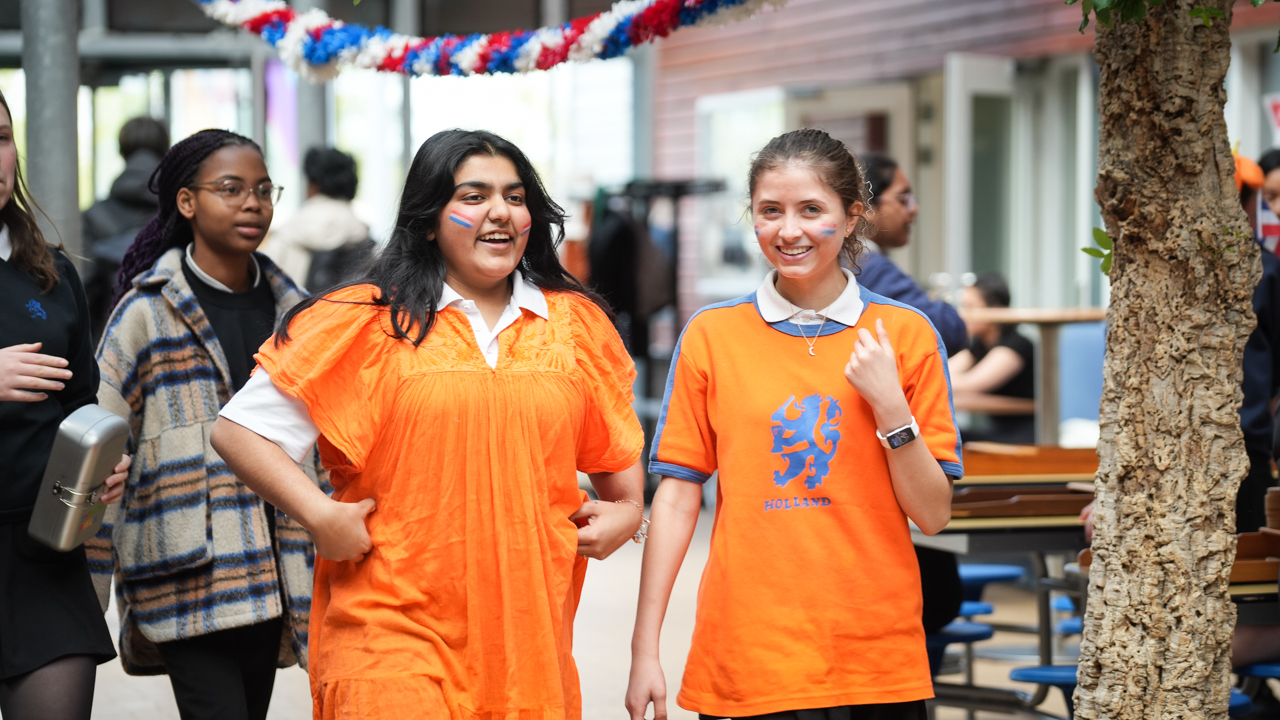
Sixth form progression and future careers
Certificate recognition
A Certificate in Dutch as a Foreign Language creates opportunities. Holders of a certificate are partially exempt from the civic integration exam (inburgerings examen) in the Netherlands. Some certificates also give access to university studies in Dutch.
Studying in Dutch
Most Flemish and Dutch colleges and universities recognise the certificates Educative Startbekwaam (B2 level of the ECFR) and Educative Professional (C1 level of the ECFR) as proof of sufficient language proficiency to start a study.
Validity period
CNaVT certificates do not have a validity period. A certificate only confirms that a candidate has a certain level at the time the exam is taken. However, receiving institutions (universities, colleges, employers) sometimes require that a certificate is not older than, say, two years. So be sure to contact the receiving institution and ask what the requirements are for a specific course or position.
Food Preparation and Nutrition
GCSE Food Preparation and Nutrition is an exciting and creative course which focuses on practical cooking skills to ensure students develop a thorough understanding of nutrition, food provenance and the working characteristics of food materials. At its heart, this qualification focuses on nurturing students’ practical cookery skills to give them a strong understanding of nutrition.
Examination board and syllabus code
AQA (601/8421/8)
Aims of the course
- This course enables students to develop their practical food preparation skills
- The course provides opportunities for students to gain a thorough understanding of nutrition
- Students will also undertake a range of experimental and investigative activities
Course details
Food preparation skills are integrated into five core topics:
- Food, nutrition and health – Macro Nutrients, Micronutrients, Nutritional Needs and Health.
- Food science – Cooking of food, Heat Transfer and the Functional and Chemical Properties of Food.
- Food safety – Food Spoilage, Contamination and the Principles of Food Safety.
- Food choice – Factors affecting Food Choice, British and International Cuisines, Sensory Evaluation, Food Labelling and Marketing
- Food provenance – Environmental Impact and Sustainability of Food, Food Processing and Production.
There is great emphasis on practical work and the use of ICT in this subject.
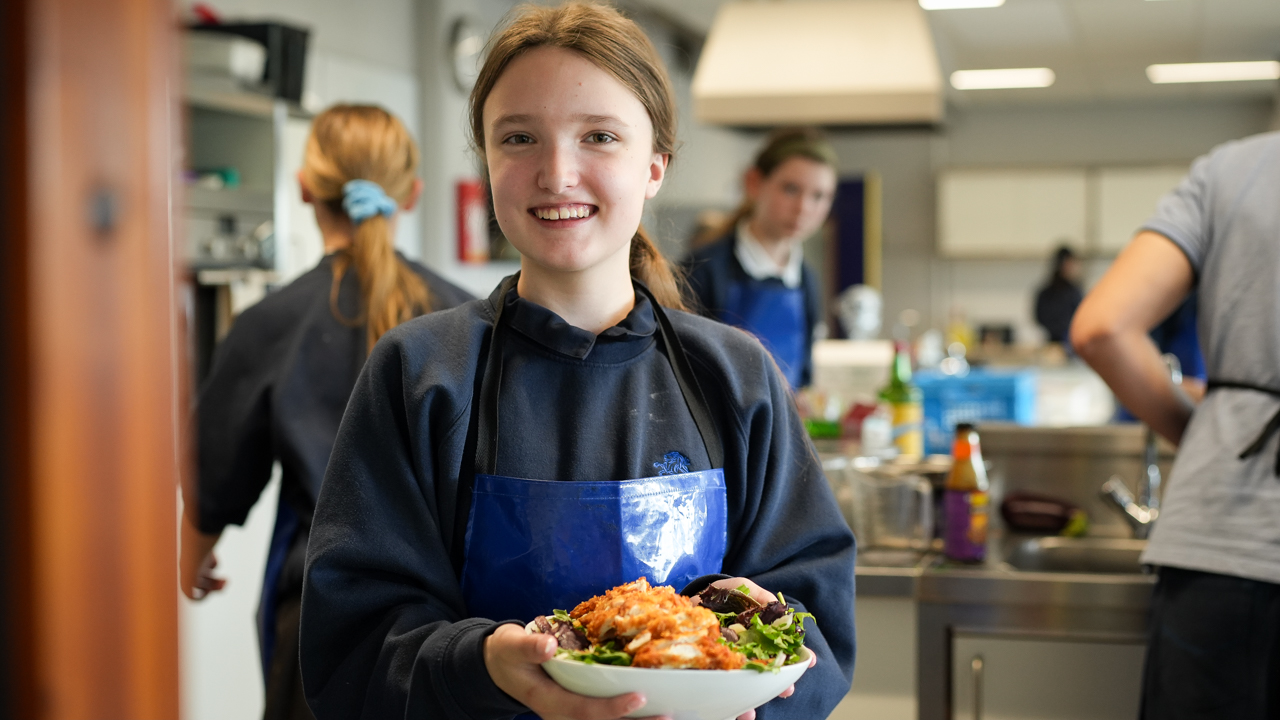
Examination and assessment details
- Paper 1: Food preparation and nutrition (50%) Written exam: 1 hour 45 minutes The paper will be made up of 20 multiple choice questions worth 20 marks and 5 questions each with a number of sub questions worth 80 marks.
- NEA1 Investigation. This is worth 15% of the final marks. Students complete and write up a food investigation.
- NEA2 Practical Examination. This is worth 35% of the final marks. Students will prepare, cook and present three dishes within three hours. Students will submit a written portfolio to support this assignment with photographic evidence.
Sixth form progression and future careers
There are opportunities in the Sixth Form to continue the study of food through a vocational BTEC course in Hospitality.
Studying food preparation and nutrition can lead to exciting and well-paid career options. Consumers are becoming increasingly reliant on the food industry to develop solutions for their nutritional needs. This course could lead you into roles such as a Chef, Food Product Developer, Buyer (who travels the world sourcing new food products for manufacturers), Food Safety Inspectors, Nutritionists, Dieticians, Teacher, Food Engineer, Food Scientist, Food Technologist, Food Photographer, Food Stylist, Hotel and Restaurant Manager, Microbiologist.
French
The GCSE French course aims to:
- develop students’ understanding of the spoken foreign language to the point where they can understand everyday conversations and extracts from radio broadcasts
- develop students’ spoken language to enable them to cope with everyday situations that they are likely to encounter in the foreign country, to relate events giving their opinions and to cope with unpredictable elements
- develop their reading skills so that they can understand the main details from a variety of sources written in the foreign language including brochures and newspaper articles or extracts from stories
- improve their written skills to allow them to write short business letters, to recount events, or produce brochures using a variety of verb tenses and expressing opinions about and reactions to events.
- allow students to transfer meaning of sentences from the foreign language into English and from English into the foreign language.
Examination board and syllabus code
Pearson Edexcel GCSE French (1FR1)
Course details
Over the two-year course we use the Edexcel GCSE French textbook with its accompanying workbook, supplemented by exercises from additional specific worksheets developed by the department from magazines and other authentic French resources.
Students have access to online platforms such as Language Gym to consolidate their learning. The emphasis on oral work that was developed at Key Stage 3 continues to be an important part of the lessons in Years 10 and 11. Some of the activities will be more demanding and will require a greater degree of negotiation and problem-solving. There will continue to be Reading and Listening Comprehension exercises similar to the ones that students are used to from lower down in the school. Writing will take on slightly more importance – tasks will be set that require a more detailed response.
In class, there will be the opportunity to work in pairs, small groups and sometimes individually. Students may also be given the opportunity to work in smaller groups with the language assistant once, or maybe twice a week. In some activities there will be a greater degree of choice – students will be able to choose the topic that they wish to discuss for one part of the oral.
The topics covered are drawn from 6 themes set by the exam board, these are:
- My personal world
- Lifestyle and wellbeing
- My neighbourhood
- Media and technology
- Studying and my future
- Travel and tourism
Examination and assessment details
The system of assessment is as follows:
- Paper 1: Speaking (approx. 10min) This exam contains a read aloud task, a role play, a description of a picture and a conversation based on the same thematic context as the picture.
- Paper 2: Listening (approx. 60min) In section A, students respond to multiple-choice, multiple-response and short-answer open response questions. All questions are set in English and students produce all response in English as well. In section B, there is a dictation, which requires students to write in French.
- Paper 3: Reading (approx. 60min) In section A, students respond to multiple choice and short answer open questions based on texts written in the target language. All questions are set in English and students produce all responses in English. Section B is a translation into English from French.
- Paper 4: Writing (approx. 1hour 20min) Both question 1 and 2 require the student to choose one task from the choice of 2, the answer to the second one needs to be longer and more detailed. Question 3 is a translation from English into French.
All papers are weighed equally (25% of the final mark).
Sixth form progression and future careers
French is available in the Sixth Form. AS and A level examinations are available.
For the IB Diploma, all students must study a foreign language either at Standard or Higher Level. French is available at both levels.
Geography
The GCSE Geography course aims to:
- reflect the modern and changing world at a variety of scales from local to global
- offer a unique view of earth science and the associated environmental issues
- offer a relevant account of the economic issues of the modern world
- show how the scientific, human and economic aspects of the modern world interact creating both problems, opportunities and responses
- offer, in its global view, a unique opportunity to explore the international dimension.
Examination board and syllabus code
AQA (8035
Course details
Paper 1: Living with the Physical Environment
(35% of final GCSE grade)
This unit will look at:
- The challenge of natural hazards: assessing the impacts and causes of earthquakes, volcanoes and hurricanes; as well as the causes and consequences of world climate change. This section has a strong focus on up to date and relevant case studies.
- The living world: understanding the interdependence of climate, water, soils, plants, animals and people in three ecosystems: tropical rainforests, hot deserts and polar regions. Understanding the development opportunities in cold and arid environments: mineral extraction, energy, fishing and tourism. As well as learning about the strategies used to manage rainforests sustainably.
- Physical landscapes: the processes shaping our coasts and the different management strategies that can be used to protect coastlines from the effects of erosion and sea level changes. Glaciation and the powerful set of processes that have shaped landscapes in the UK and beyond. Rivers and how physical and human factors affect the flood risk -precipitation, geology, relief and land use.
Paper 2: Challenges in the Human
Environment (35% of final GCSE grade)
- Urban issues and challenges: how urban growth has created opportunities and challenges. This section focuses on the challenges of the urban environment such as slums, providing clean water, providing access to services – health and education; as well looking at how best to tackle unemployment and crime; managing pollution and waste in our cities.
- The changing economic world: analysing and accounting for the global variations in economic development and quality of life. Exploring the strategies that exist for closing the development gap with reference to specific countries and case study evidence.
- Resource Management: the significance of food, water and energy to economic and social well-being. An overview of global inequalities in the supply and consumption of resources with a focus on energy and the reliance on fossil fuels. Food consumption and the growing demand for food resources: impacts of food insecurity – famine, soil erosion, rising prices, conflict.
Paper 3: Geographical Applications (30% of
final GCSE grade)
Section A: Issue Evaluation
This section develops critical thinking and problem-solving skills. Twelve weeks prior to the examination date, students will be given secondary sources relating to a geographical issue. Students will review the secondary sources provided and consider the points of view of the people involved, identify the advantages and disadvantages, and evaluate the alternatives. In the exam, they will be expected to write up a justification for
their proposed solutions in terms of their impact on both people and the physical environment.
Section B: Fieldwork
Fieldwork is an essential aspect of Geography. It ensures that students are given the opportunity to consolidate and extend their geographical understanding by relating learning to real experiences of the world. Students will undertake two geographical enquiries, each of which must include the use of primary data, collected as part of a fieldwork exercise. The data collection takes place during Activities Week in the Summer Term of Year 10.
Students will not have to produce a formal piece of coursework, but their understanding of fieldwork will be assessed under examination conditions in the following
ways:
- Questions based on the use of fieldwork materials from an unfamiliar context.
- Questions based on students’ individual enquiry work.
Examination and assessment details
Paper 1: Written exam: 1 hour 30 minutes
Question types: multiple-choice, short answer, levels of response, extended prose
Paper 2: Written exam: 1 hour 30 minutes
Question types: multiple-choice, short answer, levels of response, extended prose
Paper 3: Written exam: 1 hour 15 minutes
Question types: multiple-choice, short answer, levels of response, extended prose
Sixth form progression and future careers
Geography is offered at and A Level in the Sixth Form, and students may also study Geography as part of the IB Diploma both at standard and higher level.
Geography has strong links with the study of Geology and Environmental Sciences as well as many other subjects at university level and offers a way into the rapidly expanding areas of remote sensing, computer imaging and Geographical Information Systems, amongst others.
German
The GCSE German course aims to:
- develop students’ understanding of the spoken foreign language to the point where they can understand everyday conversations and extracts from radio broadcasts
- develop students’ spoken language to enable them to cope with everyday situations that they are likely to encounter in the foreign country, to relate events giving their opinions and to cope with unpredictable elements
- develop their reading skills so that they can understand the main details from a variety of sources written in the foreign language including brochures and newspaper articles or extracts from stories
- improve their written skills to allow them to write short business letters, to recount events, or produce brochures using a variety of verb tenses and expressing opinions about and reactions to events.
- allow students to transfer meaning of sentences from the foreign language into English and from English into the foreign language
Examination board and syllabus code
Pearson Edexcel GCSE German (1GN1)
Course details
We currently use the Edexcel GCSE German textbook with its accompanying workbook and additional worksheets developed by the department. Students will have access to online activities to support learning as well as being shown and given links to video clips and articles.
The emphasis on oral work that was developed at Key Stage 3 continues to be an important part of the lessons in Years 10 and 11. Some of the activities will be more demanding and will require a greater degree of negotiation and problem-solving. There will continue to be Reading and Listening Comprehension exercises similar to the ones that students are used to from lower down in the school. Writing will take on slightly more importance – tasks will be set that require a more detailed response.
In class, there will be the opportunity to work in pairs, small groups and sometimes individually. Students may also be given the opportunity to work in smaller groups with the language assistant once, or maybe twice a week. In some activities there will be a greater degree of choice – students will be able to choose the topic that they wish to discuss for one part of the oral.
The topics covered are drawn from 6 themes set by the exam board, these are:
- My personal world
- Lifestyle and wellbeing
- My neighbourhood
- Media and technology
- Studying and my future
- Travel and tourism
Examination and assessment details
The system of assessment is as follows:
Paper 1: Speaking (approx. 10min) This exam contains a read aloud task, a role play, a description of a picture and a conversation based on the same thematic context as the picture.
Paper 2: Listening (approx. 60min) In section A, students respond to multiple-choice, multiple-response and short-answer open response questions. All questions are set in English and students produce all response in English as well. In section B, there is a dictation, which requires students to write in German.
Paper 3: Reading (approx. 60min) In section A, students respond to multiple choice and short answer open questions based on texts written in the target language. All questions are set in English and students produce all responses in English. Section B is a translation into English from German.
Paper 4: Writing (approx. 1hour 20min) Both question 1 and 2 require the student to choose one task from the choice of 2, the answer to the second one needs to be longer and more detailed. Question 3 is a translation from English into German.
All papers are weighed equally (25% of the final mark).
Sixth form progression and future careers
German is available in the Sixth Form.
AS and A level examinations are available in German.
For the IB Diploma, all students must study a foreign language either at Standard or Higher Level. German is available at both levels.
History
GCSE History helps to establish lifelong skills – both oral and written – the ability to argue a case, to articulate and communicate what you know and understand, to sift through a wide range of evidence and come to a conclusion. Furthermore, the course will help students to understand the background to current affairs and to have a better understanding of the world we live in.
Examination board and syllabus code
Pearson Edexcel (1HI0)
Course details
Topics studied:
Paper 1: Thematic study and Historic environment. Option 10: Crime and Punishment in Britain
c1000–present.
Students will analyse how crime and punishment have changed and evolved over a thousand years by taking into account factors such as the influence of politics and belief, science, technology and societal attitudes. Topics covered include Medieval trial by ordeal, witch finding, poaching, smuggling, highwaymen, the Bloody Code, prison reform, the development of the Police Force and
CID, the case of Jack the Ripper and the abolition of the death penalty.
Paper 2: Period Study and British Depth Study – Option B4: Early Elizabethan England, 1558-88.
Topics covered include the question of her legitimacy as Monarch and the succession question, the religious settlement, society including education and attitudes towards the poor, the problem of Mary Queen of Scots, commercial rivalry with Spain in the New World, involvement in the Dutch Revolt, the Spanish Armada, Drake’s circumnavigation of the Globe and the attempted colonisation of Virginia.
Paper 2: Superpower relations and the Cold War, 1941-91.
Students will study the evolution of the Cold War between the USA and USSR and key crises such as the Hungarian Uprising 1956, the building of the Berlin Wall 1961, the Cuban Missile Crisis 1962, the Prague Spring 1968 and the invasion of Afghanistan in 1979. We will also question what led to the end of the Cold war and the fall of the Soviet Union.
Paper 3: Modern Depth Study – Option 30: Germany 1918–39
Students will study topics such as the early problems of the Weimar Republic post WW1, the impact of the Great Depression 1929–33, the founding and growth of the Nazi Party, how Hitler gained power and controlled Germany. Students will also consider Life in Hitler’s Germany for a wide range of groups.
Examination and assessment details
- Paper 1 – 1 hour 15mins – 52 marks – 30%
- Paper 2 – 1 hour 45mins – 64 marks – 40%
- Paper 3 – 1 hour 20mins – 52 marks – 30%
There are no tiered papers in History.
Exam questions are mostly short answer questions – a mix of short answer and source analysis. There is only one longer structured answer of 16 marks on each exam paper which requires you to write a balanced answer and reach a substantiated conclusion. The techniques are exactly the same as those they have been utilising in Years 7–9.
There is no coursework.
Sixth form progression and future careers
History can be studied at both A Level and IB. Government and Politics is available as an option at A level.
Music
The Eduqas GCSE Music course allows those students with an interest in all types of music to further their enjoyment and understanding of music through Performing, Composing and Listening/Set Work Study, across a wide range of musical styles.
Examination board and syllabus code
Eduqas Music (C660QS)
Course details
One of the greatest requirements for success on the Music GCSE course is an enthusiasm for making music and learning more about music. In addition to this, students should be able to read music notation(s) and be able to play an instrument and/or sing to a reasonable level of competence. It is also extremely useful to have some basic keyboard-playing skills (particularly if you have never had formal piano or keyboard lessons), as we use state-of the-art computer-based Composition/Scoring/Sequencing/Recording software (Logic Pro X, running on Apple macs) for Composing, and much of this is achieved through keyboard input.
All students should be taking, or intending to take instrumental or vocal lessons, either with BSN
Instrumental/Vocal Staff or with suitably qualified teachers outside of the school. Having a professional teacher makes a significant difference to both skills progression and the laying down of good technical foundations.
We also encourage active participation in the relevant ensemble opportunities provided not only by the Music Department, such as Choirs, Orchestra, Jazz Band, Rock Groups, etc., (as Solo and Ensemble Performance accounts for 30% of the final marks), but also in ensembles and music-making outside of school. Throughout the year, students are expected to take part, either as soloist or ensemble member, in the series of regular lunchtime and evening concerts to help further
develop their performing skills.
Examination and assessment details
Three course components: Performing; Composing; Appraising.
Performance and Composition are examined through coursework, usually submitted/recorded/examined towards the end of the Spring term of the examination
year. The Set Works/Appraising component is assessed through a written paper taken in the summer examination period.
Performing 30%
For the Performing components, students have to perform a minimum of two pieces, one of which must be an ensemble performance of at least one minute duration. The other piece(s) may be either solo and/or ensemble. One of the pieces performed must link to an area of study of the earner’s choice. The total playing time should be between 4-6 minutes.
Composing 30%
The Composition portfolio for final submission will contain two compositions one of which must be in response to a brief set by the examination board.
Learners will choose one brief from a choice of four, each one linked to a different area of study. The briefs will be released during the first week of September in the academic year in which the assessment is to be taken. The second composition is a free composition for which learners set their own brief.
Appraising 40%
This component is assessed via a listening examination.
Eight questions in total, two on each of the four Areas of Study:
- AoS1: Musical Forms and Devices
- AoS2: Music for Ensembles
- AoS3: Film Music
- AoS4: Popular Music
Two of the eight questions are based on extracts based on the following Set Works:
- AoS1 Badinerie - Bach
- AoS4 Africa - Toto
The Appraising Examination takes the form of a paper in which students have to answer specific and in-depth questions relating to the 2 Set Works(AoS1 and AoS4) and more general questions about wider listening referring to AoS1 - AoS4.
Overview:
Component 1 - Performing 30% NEA
2 performances required: 1 Ensemble and 1 Solo or another Ensemble
Total duration: 4-6 minutes
Component 2 - Composing 30% NEA
2 compositions required: 1 to a set brief from the exam board and 1 free composition
Total duration: 3-6 minutes
Component 3 - Appraising 40% Exam
Listening/Appraising exam based on 4 Areas of Study
Sixth form progression and future careers
Music at AS/A level and Music Technology at AS/A level are both available as a one or two-year course in the sixth form.
Music at IB Higher/Standard Level is also offered in the Sixth Form as a two-year course.
Please talk to the Music Department for further details.
Photography
A course in Photography will encourage students to:
- Be immersed in the process of Photography in order to develop as an independent, critical and creative thinker exploring the world around them
- Develop technical and creative approaches, building key skills to communicate visually through any lens based media - including still, film/video, animation and instant formats
- Take risks, learn from experiences, and use knowledge to create a diverse portfolio influenced by a wide variety of approaches to lens-based learning
- Explore and recognize the codes and conventions of visual imagery across genres and technologies, to interpret and understand the world in which they live, and recognise the impact and power of the visual image on our society
- Develop attributes through creative experiences including self-confidence, perseverance, self-discipline and commitment to studies
Examination board and syllabus code
AQA (8206)
Course details
Component one - 60% of total marks
Year 10 (portfolio-based study)
The first year is made up of technical workshops and gives the opportunity to explore exciting approaches in Photography. Each workshop becomes theme based looking at the work of photographers and artists to support practical processes. Such areas include portraits; studio; Fashion; Still-life; location; documentary/photojournalism; experimental and moving image. Class work is well structured to learn technical aspects of Photography with the freedom to explore more personal approaches as work develops. It is essential that research and practical work are completed out of school to complete the course. Access to your own camera would be an advantage, although we do have a class set for use by students during lesson time. Being able to print good quality imagery for book work is essential. All work produced in Year 10 contributes towards the portfolio (Component One) aspect of the GCSE.
Year 11 (portfolio-based study)
In the Autumn term of Year 11, students produce an independent, sustained study to add to their portfolio. The theme is of the students' own choosing. The work showcases the students' own talents developed during the course. It provides the opportunity for them to become critical thinkers, able to problem solve independently.
Students will find these skills easily transferable to other subjects and future education. Most find it creates a good balance to the curriculum.
Component two - 40% of total marks
Externally Set Assignment (ESA)
In Year 11, the exam board sets a series of starting points for students to work from. They prepare studies independently, similar to their previous work done in Year 11. This begins in January and ends in May.
The students produce an outcome in controlled conditions before all work is submitted for marking.
Examination and assessment details
The overall grade is based on the following,
- Component One: Portfolio – 60%
- Component Two: ESA – 40%
All assessment is based on practical work produced over the period of the course. There is no written examination or revision involved. We do have the expectation of continued study through the course to
complete all work.
Sixth form progression and future careers
Photography and lens-based studies is an important subject to study if you are interested in the general areas of Advertising, Animation (Film), Film and TV Production, Journalism and Media, Fashion and other related areas of the Creative Industries. Our department offers you the best springboard onto these.
We are extremely successful, consistently delivering high standards and student attainment. Even if you do not want to follow a career in the Creative Sector, Photography is a good subject to study because it helps you become an independent learner, a creative thinker, a reflective person, and a good organiser. All these qualities are important for every area of your life. The subject provides a challenge that stretches people’s ability, both creatively and intellectually. These are some of the main reasons why several of our students not entering the creative field carry on with the subject, as it enhances their studies in other areas.
Physical Education (PE)
The aims and objectives of this qualification are to enable students to:
- develop theoretical knowledge and understanding of the factors that underpin physical activity and sport and use this knowledge and understanding to improve performance
- understand how the physiological and psychological state affects performance in physical activity and sport
- perform effectively in different physical activities by developing skills and techniques and selecting and using tactics, strategies and/or compositional ideas
- develop their ability to analyse and evaluate to improve performance in physical activity and sport
- understand the contribution that physical activity and sport make to health, fitness and wellbeing
- understand the key socio-cultural influences that can affect people’s involvement in physical activity and sport.
Examination board and syllabus code
Pearson Edexcel (1PE0)
Course details
Practical
A variety of different sports will be looked at and practised over a period of time that support sports that the students may wish to be assessed in. These are: Badminton, Handball and Athletics (Track). In these sports we will develop an understanding of the rules and tactics used as well as coaching techniques and improving personal performance.
Theory
The theory is classroom-based, although implemented practically whenever possible. Students will cover the following topics:
- Applied Anatomy and Physiology
- Movement Analysis
- Physical Training
- Health, Fitness and Well-Being
- Sport Psychology
- Socio-Cultural Influences
In addition to this, the development and implementation of a Personal Exercise Programme (PEP) is undertaken. This will involve a series of fitness tests, goal setting and then a detailed analysis of their training. Students will be involved in the teaching, through taking control of certain aspects of the lessons – e.g. warm-ups and cool-downs.
Examination and assessment details
40% Practical
Students are assessed in their practical performance in three sports – these sports are selected by the students but must consist of at least one team and one individual activity with the final choice of activity being a free choice of either a team or individual sport. The class teacher assesses each sport and only the actual level of performance is considered. Towards the end of Year 11 a practical exam is taken in each sport where a mark is recorded.
The final 10% of the practical mark is awarded based on the student’s ability to plan, perform and evaluate a Personal Exercise Programme (PEP).
60% Theory
This is assessed through two exams. The first exam lasts 1 hour 30 minutes and examines students’ knowledge of fitness and the body systems. The second exam lasts 1 hour 15 minutes and examines students’ knowledge of health and performance.
Sixth form progression and future careers
PE is available at both AS and A-level. Please contact the PE department if you have further questions about options in Years 10/11 and the Sixth Form. PE is currently not available in the IB Diploma programme (taught in Group 4 Science as "Sport, Exercise and Health Science"). However, it is something that may be developed in the future.
There are many future careers that can develop from studying Physical Education in the 6th form.
These include:
- PE Teacher
- Personal Trainer
- Physiotherapist
- Sports Lawyer
- Sports Agent
- Sports Journalist
- Sports Commentator
- Sports Analyst
- Sports Presenter
- Sports Scientist
- Sports Psychologist
- Leisure Operations and Management
- Sports Photographer
- Sports Marketing and PR
Spanish
The GCSE Spanish course aims to:
- develop students’ understanding of the spoken foreign language to the point where they can understand everyday conversations and extracts from radio broadcasts
- develop students’ spoken language to enable them to cope with everyday situations that they are likely to encounter in the foreign country, to relate events giving their opinions and to cope with unpredictable elements
- develop their reading skills so that they can understand the main details from a variety of sources written in the foreign language including brochures and newspaper articles or extracts from stories
- improve their written skills to allow them to write short business letters, to recount events, or produce brochures using a variety of verb tenses and expressing opinions about and reactions to events
- allow students to transfer meaning of sentences from the foreign language into English and from English into the foreign language
Examination board and syllabus code
Pearson Edexcel GCSE Spanish (1SP1)
Course details
We use the Edexcel GCSE Spanish textbook with its accompanying workbook and additional worksheets and activities developed by the department. These booklets are based around the topics and draw on a wide range of source materials. Students also have access to video materials in Spanish and authentic Spanish soundtracks.
The emphasis on oral work that was developed at Key Stage 3 continues to be an important part of the lessons in Years 10 and 11. Some of the activities will be more demanding and will require a greater degree
of negotiation and problem-solving. There will continue to be Reading and Listening Comprehension exercises similar to the ones that students are used to from lower down in the school. Writing will take on slightly more importance – tasks will be set that require a more detailed response.
In class, there will be the opportunity to work in pairs, small groups and sometimes individually. Students may also be given the opportunity to work in smaller groups with the language assistant once, or maybe twice a week. In some activities there will be a greater degree of choice – students will be able to choose the topic that they wish to discuss for one part of the oral.
The topics covered are drawn from 6 themes set by the exam board, these are:
- 1My personal world
- Lifestyle and wellbeing
- My neighbourhood
- Media and technology
- Studying and my future
- Travel and tourism
Examination and assessment details
The system of assessment is as follows:
Paper 1: Speaking (approx. 10min) This exam contains a read aloud task, a role play, a description of a picture and a conversation based on the same thematic context as the picture.
Paper 2: Listening (approx. 60min) In section A, students respond to multiple-choice, multiple-response and short-answer open response questions. All questions are set in English and students produce all response in English as well. In section B, there is a dictation, which requires students to write in Spanish.
Paper 3: Reading (approx. 60min) In section A, students respond to multiple choice and short answer open questions based on texts written in the target language. All questions are set in English and students produce all responses in English. Section B is a translation into English from Spanish.
Paper 4: Writing (approx. 1hour 20min) Both question 1 and 2 require the student to choose one task from the choice of 2, the answer to the second one needs to be longer and more detailed. Question 3 is a translation from English into Spanish.
All papers are weighed equally (25% of the final mark).
Sixth form progression and future careers
AS and A level examinations are available in Spanish.
For the IB Diploma, all students must study a foreign language either at Standard or Higher Level. Spanish is available at both levels.
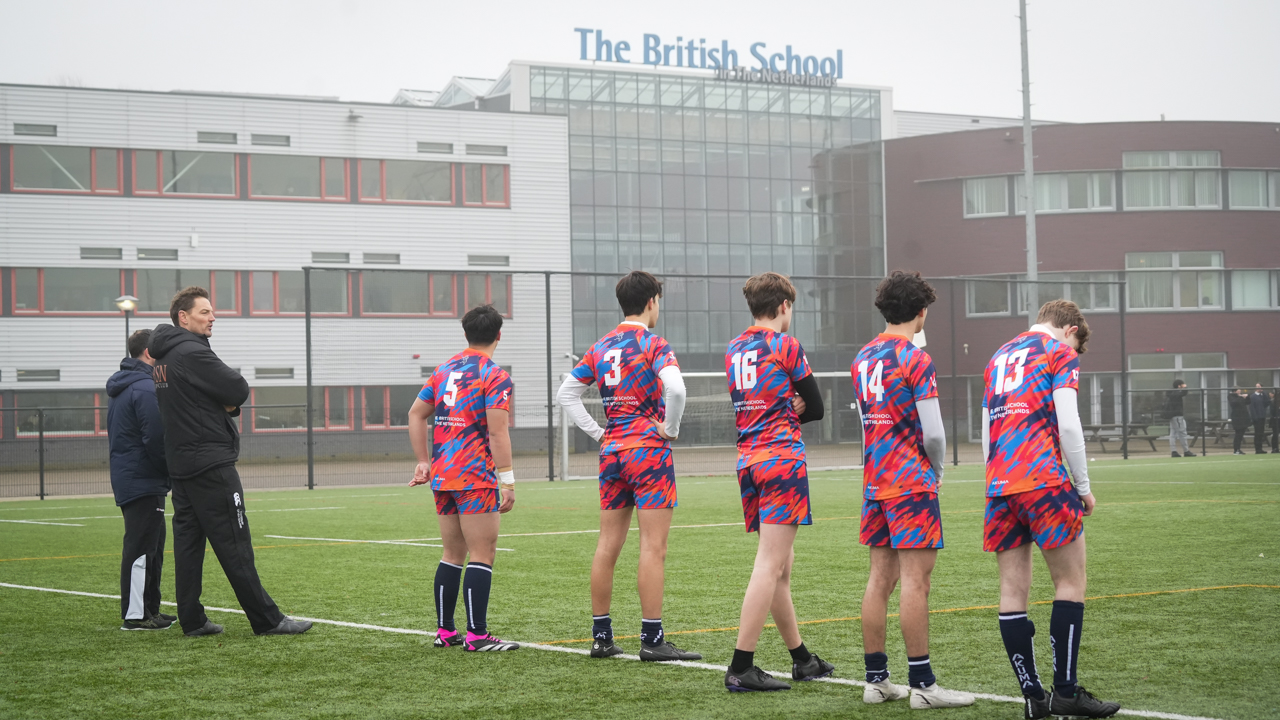
Study Skills
This course is designed to support students during Years 10 and 11. Study Skills focuses on the development of effective study techniques and learning tools that are important for academic success. It is a reinforcement of the work they will be carrying out in other subjects and will support students in all curriculum areas
This is not a GCSE course but can be taken instead of a GCSE option.
Course details
This course will allow students to develop study skills and strategies important for success in many subject areas.
The main topics are:
- Motivation/goal setting
- Learning Styles
- Organisation and time management
- for independent learning
- Memory Skills and strategies
- Reading strategies
- Research skills
- Note-taking skills and strategies
- Essay-planning and writing skills
- Self-assessment
- Revision and exam techniques
- Stress management
- Effective study environments
The course is not examined but is designed to contribute towards greater success in those subjects, which are taken at GCSE. Attending a Study Skills option is subject to Head of Year approval.








